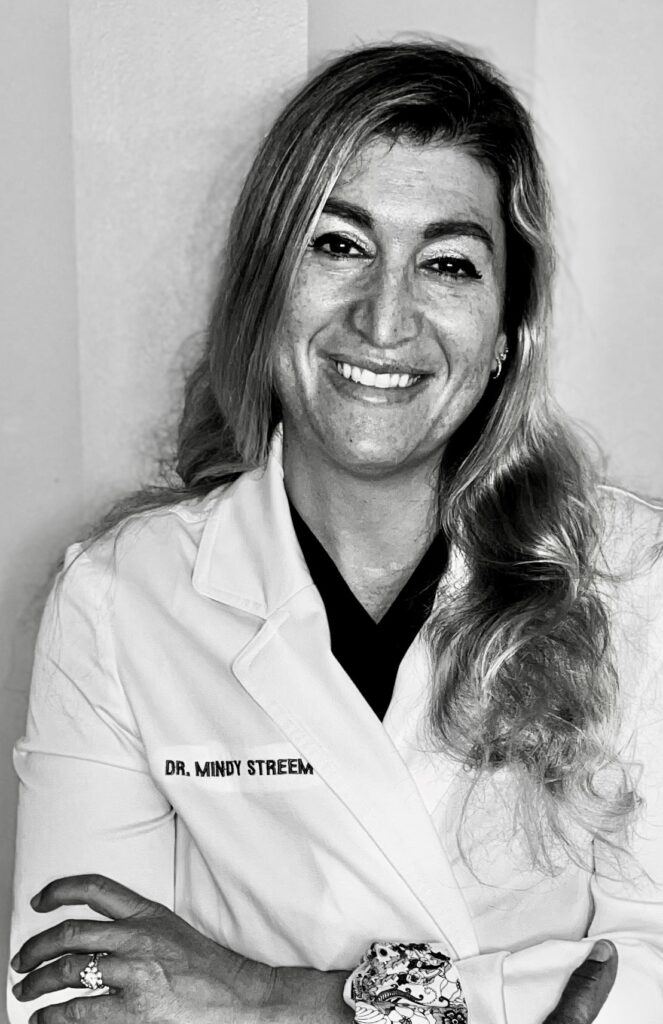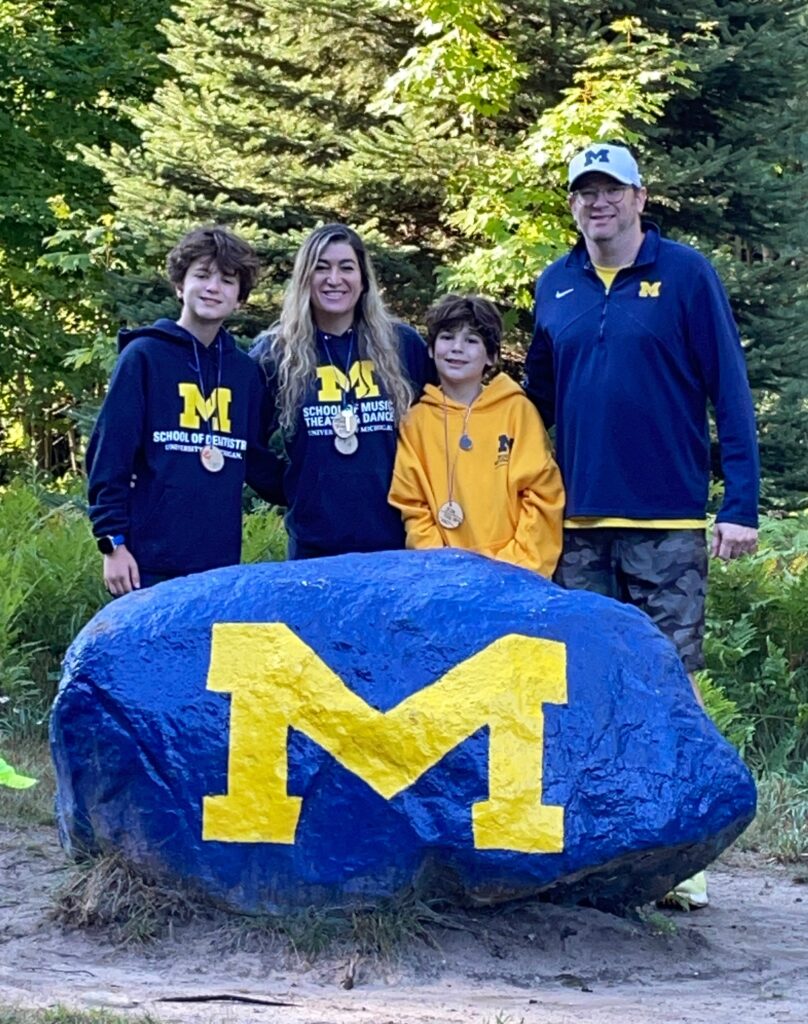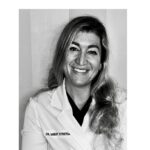Alumni Profile Q&A: Dr. Mindy (Greenblatt) Streem, DMD, MS (orthodontics), ABO9 min read

Mindy Streem’s credentials as a lifelong high-achiever are undeniable. After graduating from high school in three years in her hometown of Toledo, Ohio, she enrolled at age 17 at the University of Michigan. In a dual, 5-year program, she earned a Bachelor of Science in biology and a Bachelor of Musical Arts in voice performance. Her parting U-M vocal performance was to sing the National Anthem during the 2001 commencement ceremony at Michigan Stadium. Then it was off to Harvard University to earn her dental degree, with a return to U-M for her master’s degree in orthodontics that she completed in 2008. She practiced orthodontics in Virginia for three years while her husband Jason Streem (U-M DDS 2005) completed a periodontics residency at Virginia Commonwealth. In 2011, they moved to Jason’s hometown of Cleveland, Ohio, where he joined a periodontics practice and Mindy bought an orthodontics practice. After three years of solo practice, she partnered with another orthodontist in a shared practice for 10 years. In early 2023, she left the practice to broaden her dentistry experience as a consultant, educator and lecturer for Clear Correct, an aligner company that is part of Straumann, Inc. This August, she left that position to take a break and consider several options. She ultimately decided she enjoys teaching and coaching so much that in January 2025 she will join a national company as Orthodontic Clinical Director responsible for educating dentists around the country about clear aligners. Mindy recently discussed her love of U-M and Ann Arbor, her path through dentistry, and the importance of volunteering and giving back to the profession. She says her people skills can be traced to her father, Barry Greenblatt, the founder of the Barry Bagels restaurant group, who was known for his work ethic, warm personality and camaraderie with his customers.
Q: With a talent, background and love of vocal performance, how did you make the career move to dentistry?
A: When I was in undergrad at U-M, I loved the musical performance part, but I was also both pre-med and pre-dent and majoring in biology. In the summers, I worked at a pediatric dental office as a dental assistant. I also followed around my dad’s best friend, who was a pediatric cardiologist. He was amazing but I realized I didn’t want to work with seriously ill children, but I did like working with children. So pediatric dentistry seemed perfect. I applied to 11 dental schools and got into all 11, including U-M and Harvard, which I randomly applied to, figuring I might as well. As a pre-dent at U-M, I had a lot of contact with Professor Marilyn Woolfolk and several others at the U-M dental school, so there were lots of people there who hoped that I would go to U-M. I narrowed it down to North Carolina, U-M and Harvard and made a list of pros and cons. I decided you can’t say no to Harvard, so I said yes to Harvard.
Q: How did you progress to Orthodontics?
A: At Harvard I was thinking pediatric dentistry, but then I did a rotation at the craniofacial clinic at the Boston Children’s Hospital. I fell in love with craniofacial anomalies, structure and development, and I realized I really liked orthodontics. I applied to several ortho programs, but I knew I wanted to go back to Michigan for many reasons. For one, Ann Arbor is my favorite place in all the world. And, two, (faculty member) Jim McNamara was part of the program and he is one of the most accomplished ortho experts in the world and one of the most wonderful mentors in the world. I wanted to work under him. I loved every second of my three years in the program. Our residency was six women and one man. We loved, loved, loved the fact that we had several women who could bond together. We would bend wire and talk about our day-to-day lives. It was like we were going through these life things together as future female practitioners. I made so many friends and it was a great experience. I try to go back for the Moyer’s Symposium every year.
Q: You enjoyed practicing orthodontics for 15 years, but then decided to explore other areas of the profession. What were the factors there?
A: I loved practicing. I wanted to know my patients, to talk to my patients. That’s my favorite part of it. I love to meet people. But I felt like there was more I wanted to do other than private practice. I wanted to branch out to other aspects of orthodontics. My husband was supportive so I decided to try new things. As a clinical advisor, I could work virtually from home, but I also got to travel and connect with dentists all around the country and in Canada. The other great part was that I discovered that I loved the education part of it, which had never been on my radar. My performer background gave me a lot of wonderful experience so that I could lecture in front of large groups and not be nervous.
Q: In recent years you’ve also volunteered in various ways, considered teaching at a dental school, maybe pursuing a PhD in biology, positions in corporate dentistry or even returning to practice. One niche you have embraced is giving presentations to local, state and national dentistry organizations on the topic of making the dental office a safe space for LGBTQ+ patients, particularly young people. Tell us about that.
A: I wrote an article for the Cleveland Jewish News in 2021 that talked about the need for all of us in dentistry to work together to create a safe space for the LGBTQ+ youth community. Understanding and respecting these youth is so important during such a transformative time in their lives. Someone who read the article asked me to put together a presentation for a dental group and I created “How to Treat LGBTQ Patients and Transgender Patients in the Dental Setting.” I gave it the following year at the Ohio Dental Association conference and have presented it to several other groups. The reason I did this is because I had a lot of transgender patients. I was treating people at that very vulnerable age, when kids start to question their identity and gender. Those of us who have consistent contact with this community should be seen as a safe place. I can relate to what they experience because when I was in high school I was bullied a lot because I was smart. I always looked to the safe spaces in my life, so I would always veer toward the teachers who made me feel comfortable and safe in school when I was getting bullied. So what I wanted to do as an orthodontist, knowing that these patients see me every six weeks, I wanted to be a safe space for the transgender patients, for the kids who are questioning their gender and identity. And I wanted to make sure that they knew that even if they didn’t feel safe at home or school, that they could feel safe in my chair. There is a big need for the older generation of doctors and dentists to really understand how to treat these patients and make them feel comfortable in their offices. This is a very vulnerable group of people and it is so important to them if we make them feel safe and comfortable in our dental offices. I very early on began wearing pins on my clinic coat that said “pronouns matter” and various other LGBTQ pins. I started by educating my staff and now I’m presenting to other groups. It is amazing how receptive the dental community is, and how much interest there is in this education.
Q: You have done a lot of volunteer work dating back to college and your professional schools. You currently mentor U-M students for LSA Connect through the LSA Hub program of the College of Literature, Science and the Arts. You also mentor for the American Association of Women Dentists and for the next two years you will be president of the Harvard Dental Alumni Association. What motivates you to give back?
A: I want to help motivate the next generation to become compassionate doctors who care about their patients. I want to make sure students understand that there are people out there to guide them, support them and hold their hand along the way. It’s not an easy process to become an orthodontist, and I was grateful to so many mentors in my life. I wanted to be just that for other students. I just received an email today from a girl I mentor at U-M and she said: “I just wanted to thank you again for taking the time to answer my questions yesterday! I cannot express how much it meant to me and how reassuring it was! Your positive and joyful outlook made me look forward to the future so much more!” It warms my heart that I can help others in any way that I can.

###
The University of Michigan School of Dentistry is one of the nation’s leading dental schools engaged in oral healthcare education, research, patient care and community service. General dental care clinics and specialty clinics providing advanced treatment enable the school to offer dental services and programs to patients throughout Michigan. Classroom and clinic instruction prepare future dentists, dental specialists and dental hygienists for practice in private offices, hospitals, academia and public agencies. Research seeks to discover and apply new knowledge that can help patients worldwide. For more information about the School of Dentistry, visit us on the Web at: www.dent.umich.edu. Contact: Lynn Monson, associate director of communications, at [email protected], or (734) 615-1971.

